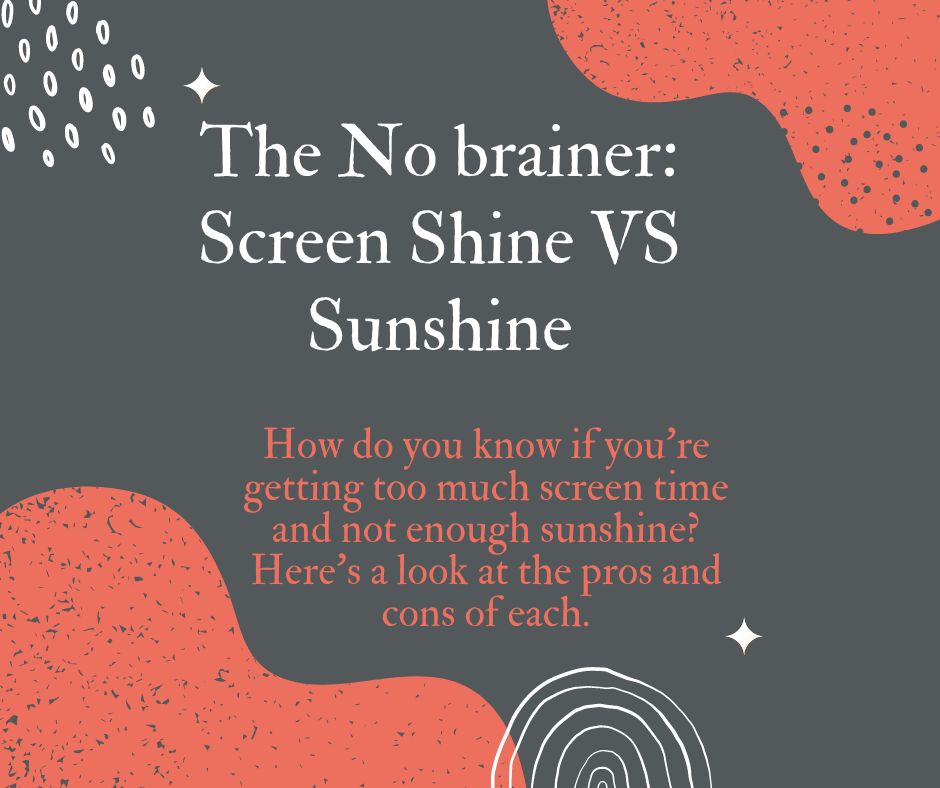The No brainer: Screen Shine VS Sunshine
There's been a lot of talks recently about the dangers of screen shine – that blue light emitted from our gadgets and devices, that is supposedly wrecking our sleep, productivity, and eyesight.
But is it really that bad? Or is screen time simply scapegoated for all sorts of modern-day maladies?
In today's post, we will give you my take on screen shine and see how it compares to good old-fashioned sunshine.
Who knows, maybe you'll end up spending your summer in the great outdoors instead of cooped up in front of your computer!
An Abundance Of Light
Imagine this - It’s some time before the industrial revolution, you are gathered with your family, right around dawn.
You are all looking at the picturesque sky scape as the night sets upon Earth.
As soon as the sun hits the horizon, you light a fire and gather around it.
The fire emits warmth and relaxing, warm colours - Orange, yellow, and even some light blue at the base of each flame.
Relaxing, isn’t it?
Well, nowadays it’s much more different - We are all bombarded by artificial lights, not just from our screens, but also from the environment.
Evolutionarily Speaking…
Certainly, in moderate exposure, artificial light won’t have any adverse side effects on your health.
However, evolutionarily speaking, our brains were made to function with the day-night cycle of our planet.
As soon as the sun rises and rays hit your eyelids, this is a signal for the body to wake up and produce day-time neurotransmitters (chemical messengers) like serotonin.
These messengers make you more alert, aware and active.
On the flip side, when the sun goes down, this absence of light is a signal for the brain that it’s time to relax, produce night-time neurotransmitters and eventually, doze off and go to sleep.
That is to say, the light that goes through our eyes is a major contributor to our natural sleep-wake cycles.
Eyes Glued.
Now, with that being said most of us are glued to our screens for hours every day.
And while there are some clear benefits to this technology, there is also a downside.
One of the main concerns is the blue light that screens emit.
Studies have shown that blue light can have a negative impact on our sleep patterns.
It suppresses the production of melatonin, a hormone that helps us to drift off to sleep.
This means that people who use screens late at night may struggle to get a good night's sleep.
In addition, blue light has been linked to eye strain and fatigue.
So if you find yourself struggling to fall asleep after staring at a screen all day, it could be due to the blue light exposure.
While there is no need to eliminate screens from your life altogether, there are things you can do to mitigate the potential side effects of blue light.
Here are our 3 best tips!
Take Frequent Breaks
It's no secret that the general population is spending more and more time in front of screens.
Sometimes, it even gets to the point where you spend 8 hours on your computer, working, only to go back home and spend another 3 in front of the TV, to unwind while watching your favourite series…
Whether we're working on our laptops, scrolling through our phones, or watching TV, screens are a constant presence in our lives.
And while there's nothing wrong with a little screen time, it's important to take breaks from time to time.
So if you find yourself feeling drained after staring at a screen all day, take a break!
Go for a walk, read a book, or just step away from your device for a few minutes.
You'll be surprised by how refreshed you'll feel.
Wear Blue-Light Glasses
Why are so many people wearing blue-light-blocking glasses these days? It's not just because they look cool (although let's be honest, they do look pretty cool).
Blue light blocking glasses are designed to protect your eyes from the harmful effects of blue light that we just talked about.
That's why more and more people are choosing to wear blue-light-blocking glasses when they're working or spending time on their electronic devices.
And so, if you're looking for a way to reduce your exposure to blue light, consider investing in a pair of these stylish glasses!
Get Sun Exposure
Because we spend most of our time in office spaces, in front of screens, and surrounded by artificial light, most of us don’t really get enough sun exposure.
Why would you need sun exposure, you may ask? Well, because it is necessary for the natural production of vitamin D!
So here’s some logical advice - Take breaks from screen shine and get some time under the sun, on the daily basis!
Your body and brain will thank you.
Final Thoughts
We should all heed the advice of our elders (and many of the modern health gurus) and get more sunshine, fresh air, and exercise.
Spend less time in front of screens, and if you really can’t resist spending some time on your phone or computer before bed, put on your blue-light-blocking glasses and rock on!
Got any more questions about screens and sun exposure?

